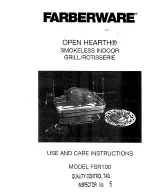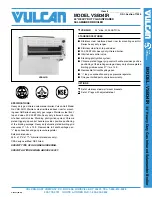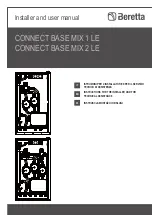
5
User’s
4. CONDENSATE DRAIN
This appliance is fitted with a siphonic condensate trap system
that reduces the risk of the appliance condensate from freezing.
However should the condensate pipe to this appliance freeze,
please follow these instructions:
a. If you do not feel competent to carry out the defrosting
instructions below please call your local Gas Safe Registered
installer for assistance.
b. If you do feel competent to carry out the following instructions
please do so with care when handling hot utensils. Do not attempt
to thaw pipework above ground level.
If this appliance develops a blockage in its condensate pipe, its
condensate will build up to a point where it will make a gurgling
noise prior to locking out an “L2” fault code. If the appliance is
restarted it will make a gurgling noise prior to it locking out on a
failed ignition “L2” code.
To unblock a frozen condensate pipe;
1. Follow the routing of the plastic pipe from its exit point on the
appliance, through its route to its termination point.
Locate the frozen blockage. It is likely that the pipe is frozen at
the most exposed point external to the building or where there
is some obstruction to flow. This could be at the open end of
the pipe, at a bend or elbow, or where there is a dip in the pipe
in which condensate can collect. The location of the blockage
should be identified as closely as possible before taking further
action.
2. Apply a hot water bottle, microwaveable heat pack or a warm
damp cloth to the frozen blockage area. Several applications
may have to be made before it fully defrosts. Warm water can
also be poured onto the pipe from a watering can or similar.
DO NOT use boiling water.
3. Caution when using warm water as this may freeze and cause
other localised hazards.
4.
Once the blockage is removed and the condensate can flow freely,
restart the appliance. (Refer to “To Light the boiler”)
5. If the appliance fails to ignite, call your Gas Safe Registered
engineer.
Preventative solutions
During cold weather, set the central heating temperature knob
(C) to maximum, (Must return to original setting once cold spell is
over).
Place the heating on continuous and turn the room thermostat
down to 15ºC overnight or when unoccupied. (Return to normal
after cold spell).
5. GENERAL INFORMATION
BOILER PUMP
The boiler pump will operate briefly as a self-check once every 24
hours, regardless of system demand.
MINIMUM CLEARANCES
Clearance of 165mm (6
1
/
2
”) above, 100mm (4”) below, 2.5mm
(9
1
/
8
”) at the sides and 450mm (17
3
/
4
”) at the front of the boiler
casing must be allowed for servicing.
Bottom Clearance
Bottom clearance after installation can be reduced to 5mm
This must be obtained with an easily removable panel, to enable
the system pressure gauge to be visible and to provide the 100mm
clearance required for servicing.
ESCAPE OF GAS
Should a gas leak or fault be suspected contact the National Gas
Emergency Service without delay.
Telephone 0800 111 999
.
Ensure that;
- All naked flames are extinguished
- Do not operate electrical switches
- Open all windows and doors
CLEANING
For normal cleaning simply dust with a dry cloth. To remove stubborn
marks and stains, wipe with a damp cloth and finish off with a dry
cloth.
DO NOT use abrasive cleaning materials.
MAINTENANCE
The appliance should be serviced at least once a year by a Gas
Safe Registered Engineer or in IE a Registered Gas Installer
(RGII).


























